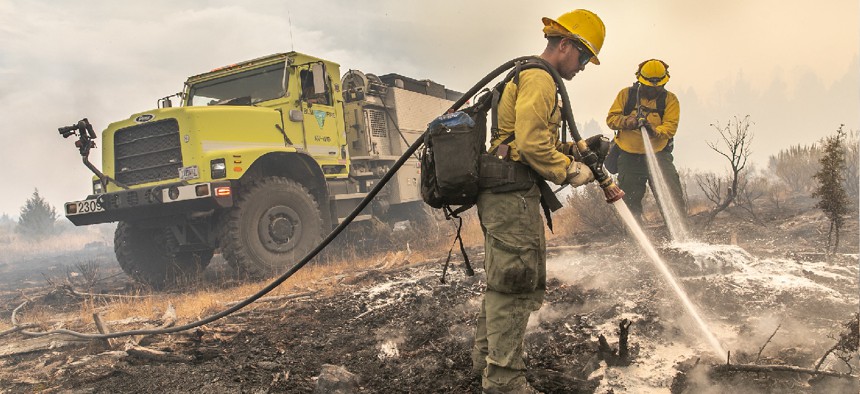
Engine crew members mopping up spot fires on the Bureau of Land Management's Trout Springs Prescribed Fire in southwest Idaho in 2019. Neal Herbert/Department of the Interior
Low Pay Remains the Largest Barrier to Federal Wildland Firefighter Recruitment, GAO Says
Although the Biden administration has taken multiple steps to boost compensation for federal firefighters, the government watchdog agency reports those measures are both not enough to compete with state and local governments and only temporary.
The largest obstacle inhibiting the federal government’s ability to recruit and retain wildland firefighters remains pay, a federal watchdog agency reported last week.
The Government Accountability Office said that although the Biden administration has taken a number of steps to boost the compensation of federal wildland firefighters, including instituting a $15 minimum wage for the profession and authorizing raises up to $20,000 or 50% of base pay, those measures are still not enough to compete with state and local governments. And the latter initiative is only funded through fiscal 2023, absent congressional action to make the raises permanent.
“[U.S.] Forest Service and Interior [Department] officials said that in California, state firefighters are paid more than federal wildland firefighters, which acts as a disincentive for federal firefighters to remain in federal service,” GAO wrote. “Officials and seven stakeholders also said that potential candidates could seek higher pay for less dangerous work in other fields, such as food service . . . Forest Service and Interior officials and four stakeholders said that while recent steps to increase federal wildland fighter pay are positive, they believe that pay still does not reflect the demands of the job and remains uncompetitive with nonfederal entities.”
Another barrier to the government’s ability to recruit and retain wildland firefighters is difficulties in career advancement, some of which is structurally baked into the current career ladder and others due to the increasing workload due to the expanding wildfire season, GAO said.
“In order to advance in their current position, or move to a different firefighting position, firefighters are required to have a certain amount of experience and meet training and certification requirements,” the report states. “However, firefighters’ extensive work in the field during fire season makes it difficult to attend training needed to advance their careers or to learn new skills for a different position, according to Forest Service and Interior officials and three stakeholders.”
And in some cases, the only way for a federal firefighter to improve their qualifications is to temporarily leave their position, which in turn negatively impacts the firefighter corps’ ability to enter the field.
“One individual we interviewed, who is both a representative of a selected stakeholder organization and a current firefighter, told us that the qualifications for her next firefighter position do not naturally occur in her current position,” GAO wrote. “In order to get those qualifications, she said that she would need to temporarily leave her position with her current crew. However, if she steps out of her current position to obtain these qualifications, it would strain the capabilities of her current crew, which could potentially limit its ability to be deployed.”
The Forest Service, Interior Department and the Office of Personnel Management are currently working on plans to establish a new, dedicated wildland firefighter occupational series, instead of the forestry technician classification federal firefighters currently fall under. Officials say this initiative will provide firefighters with position descriptions that better reflect their duties, improve pay and provide a clearer path for professional development, although it will not be implemented until next year.
“Officials and stakeholders said that classifying firefighting positions under the forestry or range technician occupational series—as most positions have been since 1972—does not recognize the physical demands of, or expertise involved in, firefighting,” the report states. “This has contributed to low morale, as the individuals in these positions take pride in their work as firefighters and want to be recognized for that work, according to an agency document.”
Stakeholders also told GAO that poor work-life balance and mental health challenges reduce the government’s ability to retain wildland firefighters. Some of this stems from the expanding wildfire season, combined with the staffing shortage federal agencies tasked with suppressing wildfires face, but stakeholders said some operational tweaks could also help alleviate the issue.
“Three stakeholders we interviewed also suggested that changing the agencies’ approach to deploying wildland firefighters may provide better work-life balance,” GAO wrote. “For example, one stakeholder said that, whereas the federal agencies typically deploy firefighters for 14 days at a time, one state firefighting agency deploys firefighters for shorter periods, allowing firefighters to return home more frequently. The stakeholder suggested that federal agencies could consider a similar approach.”







